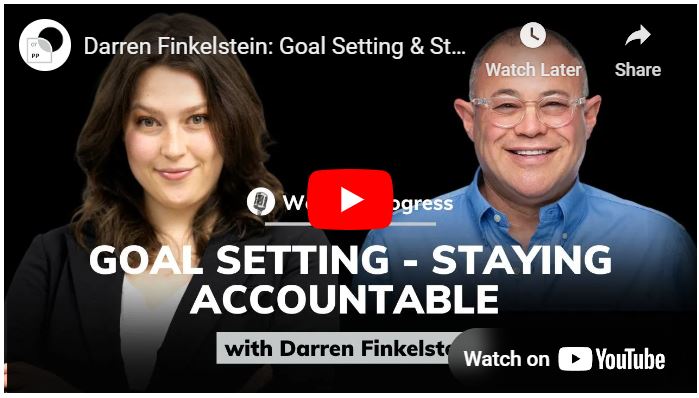Strategic thinking isn’t just for executives. It matters at every level of business. It’s about making thoughtful choices now that shape tomorrow’s direction. Whether you’re leading a team or making decisions for a whole organisation, those moments matter. Strategy offers guidance. It frees you from the cycle of repetitive tasks and redirects your attention from the urgent to the significant.
Discover your Accountability Score and increase the probability of smashing your GOALS and Getting Sh!t Done!
It’s easy to get stuck in day-to-day tasks, especially when things feel unpredictable. That’s why building a long-term focus is worth it. Working with a business coach and mentor can sharpen your thinking and provide the tools needed to make better decisions over time. You stop reacting and start leading with confidence and intention.
What Is Strategic Thinking?
Strategic thinking is the ability to plan ahead with purpose. It involves making well-considered choices that line up with where you want the business to go. It goes beyond simply setting lofty goals. It’s also about connecting your daily actions to future outcomes. This kind of thinking keeps you grounded but forward-focused.
What makes it different from operational thinking?
– Operational thinking deals with daily tasks. It focuses on ensuring seamless operations.
– Strategic thinking is about asking why something is being done and whether it supports long-term business goals.
– Operational thinkers make sure everything runs today. Strategic thinkers focus on building the right outcomes for tomorrow.
Imagine you’re overseeing an overworked team. The operational approach might be to tweak workloads and improve workflows. The strategic approach would step back and ask why workloads kept growing. Is it a hiring issue? Is it a process problem? That kind of bigger-picture lens opens up more lasting solutions.
Building this skill takes practice. It means learning to pause, reflect, and question before diving into action. The more you do it, the more natural it becomes—and the more often it helps you make strong business decisions.
Benefits Of Strategic Thinking For Business Success
When strategic thinking is baked into the way a business operates, things start to align more naturally. You gain more control over where the business heads and how teams contribute. Here’s what that looks like in action:
– Better decision-making
With a clear strategy, decisions become easier. You stop guessing and start choosing based on purpose and outcomes.
– Smarter resource use
Knowing what matters most helps you use time, people, and budgets more wisely. Distractions are easier to avoid.
– Clearer direction across teams
Everyone knows the big goals and how their work contributes. That builds engagement, trust, and clarity.
– Improved adaptability
Strategic thinkers can pivot faster. They are able to anticipate changes and make necessary adjustments before issues escalate.
One business we worked with grew quickly but found themselves hitting a ceiling. They had success in the short term but lacked structure for the long run. Once they focused on strategy—setting measurable goals and reviewing them regularly—they began to move with more intention. The team improved their use of time and began delivering higher quality results for their clients.
Being strategic doesn’t lock you into rigid plans. It means you always know where you’re going. You can adjust as needed, without losing the bigger picture.
Steps To Develop Strategic Thinking Skills
Wanting to think strategically is a beneficial start, but it needs consistent effort to become a natural part of your daily work. Here are six things that can help you build that muscle:
1. Set long-term goals
Think beyond immediate wins. Start planning for one year out, then break that down into smaller, actionable steps. Work backwards from where you want to be.
2. Make time to think
Strategy doesn’t happen in spare minutes. Carve out time regularly to look at big goals and review your progress. Quiet planning time is underrated.
3. Ask better questions
Before jumping into action, pause and question the purpose. Why are we doing this? What’s the goal? Is there a better option on the table?
4. Seek outside opinions
Diverse perspectives can provide valuable insights. Talk to mentors, peers, or team members. New perspectives often unlock fresh solutions.
5. Reflect on past actions
Look at past outcomes—both wins and missteps. What worked well? What didn’t? What can you apply moving forward?
6. Stay curious
Strategic thinkers stay open to change. They notice industry trends, test out ideas, and don’t default to the usual way of doing things.
These small changes can spark major shifts in how you approach work. Over time, these habits create a stronger, more focused mindset that influences every part of your business.
How A Business Coach And Mentor Can Help Build Strategic Thinking
Wanting to work strategically is one thing. Sticking with it consistently, especially when things feel chaotic, is another. That’s where a business coach and mentor come in. They become both a sounding board and a mirror—helping you stay accountable and see gaps you might miss when working alone.
A coach will challenge the way you think. They’ll ask questions that push you to explore more options, uncover blind spots, and strengthen your reasoning. Instead of repeating old habits, you’ll build new ways of approaching challenges with clarity and intent.
They also offer consistency. When deadlines and distractions pile up, it’s a coach who’ll remind you of your long-term goals and keep your focus steady. Regular check-ins keep your plans from collecting dust and ensure they guide your choices.
That kind of insight shortens learning curves. Coaches often bring experience from across industries. They’ve seen what works and what stalls progress—and that wisdom can help you make quicker, better-informed decisions.
Working with a mentor is about progress, not perfection. You’ll develop practical tools, sharpen your judgement, and carry those lessons into every part of your work.
Ways To Cultivate A Strategic Mindset Inside Your Business
Strategic thinking grows faster in the right environment. Make it part of your business culture, and your teams will naturally pick up the habit. It starts with leadership—but it works best when everyone contributes.
Here’s how to help that kind of culture take root:
– Connect everyone to the big picture
Understanding the business’s direction boosts people’s confidence in making informed day-to-day decisions.
– Ask for insights from all levels
Team members have valuable input. Those on the ground often see issues—or opportunities—before leadership does.
– Celebrate big-picture thinking
When someone shows foresight or shares a smart idea, highlight it. That sets a tone others can follow.
– Make time for team reflection
Build in time to step back and evaluate. This could be monthly check-ins or quarterly planning sessions.
– Develop leaders
Your team leads help shape the attitudes of others. Make sure they’re equipped to think strategically and supporting others in doing the same.
Over time, the ability to think strategically becomes instinctive. Teams start asking better questions, show more initiative, and react less when things go off track. You’ll see alignment across departments and progress that feels steady and shared.
Building A Forward-Thinking Business
Strategic thinking changes how a business moves. It helps leaders and teams make decisions based on what matters—rather than noise or pressure. It brings calm, clarity, and consistency. And it’s something that can be learned, practiced, and strengthened.
With the right support and mindset, businesses stop drifting and start moving on purpose. It’s not about speed—it’s about focus. It’s about knowing your destination, how to get there, and building habits that keep you going.
Strategy isn’t something you visit once a year. It’s a way of being. And when your business adopts that approach, progress becomes expected—not occasional. You spend less time guessing and more time growing.
“Tick Those Boxes” specialises in helping individuals and organisations become more accountable. Contact our team to see how our programs may help you establish a more effective and accountable workplace, allowing you to do the things you say you will do and getting your teams to do the same.
Strategic thinking is a journey best taken with support. Partnering with a business coach and mentor can help you stay focused, challenge your assumptions, and align your daily actions with your long-term vision. At Tick Those Boxes, we understand the power of accountability in achieving sustained business success. “Tick Those Boxes” specialises in helping individuals and organisations become more accountable. Contact our team to see how our programs may help you establish a more effective and accountable workplace, allowing you to do the things you say you will do and getting your teams to do the same.


